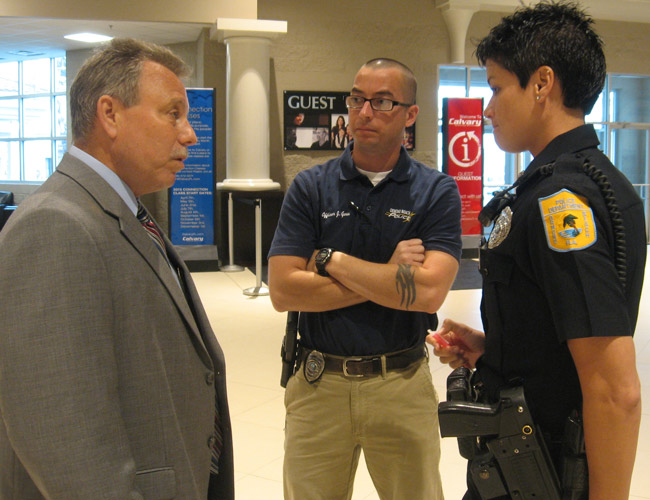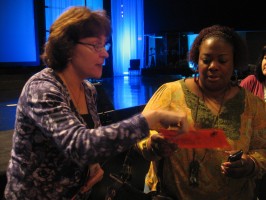
Using stories drawn from real-life cases, participants in the Circuit 7 Domestic Violence Summit–an annual training event for police agencies in Flagler, Volusia, St. Johns and Putrnam counties–tried to understand what it would be like to walk in the shoes of victims coping with the criminal justice system.
Called “Walking In Her Shoes,” the learning exercise kicking off the summit sent participants walking back and forth to different areas of the large theater-like Calvary Christian Center sanctuary in Ormond Beach, depending on the choices made, such as staying with a partner, returning to family or going to the Department of Children and Families.
“If you think this is confusing, really put yourselves in their shoes and see how frustrating this is,” Darlene Wolfson, director of outreach programs for the Domestic Abuse Council, said of the challenges faced by victims. Those challenges may run concurrently to victims’ difficult and at times brutal circumstances, as when the victim is the target of domestic or sexual violence. Even when circumstances are more routine, they can be trying.
Wolfson sometimes stages the learning exercise with props such as a bag of groceries and a stroller for the role-playing exercise to show how a simple instruction to apply for food stamps would be a challenge for a single mother with three children and a stroller trying to get on a bus.
R.J. Larizza, state attorney of the Seventh Judicial Circuit, who sponsored the daylong training Friday, joined in the exercise, following the challenges of a lesbian couple with a controlling partner. Victims need someone to help them navigate the criminal justice system and social service agencies, he said.
“In all these stories, if people along the way can recognize what’s going on and do something, we can make a difference,” Larizza said. “Some of these cases we cannot say, ‘We’ll come back tomorrow,’ or ‘We’ll come back another day.’ We have to do something now.”
The state attorney’s urgency–and perhaps frustration–was apparent as he repeatedly urged the law enforcement officers, prosecutors, social service representatives and non-profit officials at the summit to go a step beyond to gather information and help the victim.

Participants talked about the role-playing to the entire group. “I found it extremely frustrating,” one woman said. Another woman compared walking “feet” inside the sanctuary to traveling “miles” to different agencies, adding, “I feel like it’s a dog chasing her tail. I can only imagine a 17-year-old not knowing where to go, a mom not being able to help and the agencies not knowing where she is.” Another participant talked about how difficult it was for a victim to get away from her abuser. “To create a new life is a problem,” she said. “And the system almost set her up to fail.”
Michele Simonsen, an assistant state attorney who organized the summit, urged participants to think, when they go back to their jobs, of one thing they could do to improve the way they handle domestic violence cases. “I’m always looking for new ways to win cases,” she said. One new strategy is looking for violations of pretrial restrictions in both domestic violence and dating violence cases. Other tips included getting 911 calls, calls from jail cells and collecting as much information as possible from the scene, including photographs and videos.
Simonsen also participated in the role-playing exercise. Her victim had talked with a domestic violence program. “It looked like she was going to make it,” Simonsen said. “One of the most frustrating things for me when I’m calling victims or talking to victims on the phone is, is this victim going to get to me. That’s where I feel helpless.”
Summing up the role-playing, Wolfson said, “One of the things the stories have in common is the abuser, when you first meet him, he looks pretty good. A lot of you have clients who have stood before you and said, no one will help me. You went to a lot of different stations and met a lot of different people. That’s a lot of people to keep track of. Wouldn’t it be good if there was one person who could take you to each of those agencies?”
Capt. Jerome Miller of the Apopka Police Department talked about how his agency at one time was making a domestic violence arrest on only 18 percent of its domestic violence calls. The department put all sworn officers through training designed to compel more compassion from the officers, and to elicit more careful investigations. Officers toured a shelter for battered women to become aware of services available. A form used by officers was changed to eliminate a box to be checked if a victim did not want to prosecute.
“You can imagine what kind of message was sent when an officer leaned over to a victim and asked, ‘Do you really want to prosecute?’” Larizza said. Larizza said such a box on a form and such a question by an officer was like saying, “If you don’t care, we won’t care,” and officers might stop seriously investigating.
The state attorney urged summit participants to care and take the step to help. “Have you ever called an agency and they said they couldn’t help you, but you were so angry you called back and the second time you got another person who was able to help you?” Larizza said. “Be that second person.”
Larizza participated through every aspect of the summit, including answering questions individually after the program was over. “I think everyone cares about their job,” Larizza said. “Sometimes they just need to be pointed in the right direction.”
Meanwhile, at the governor’s mansion in Tallahassee, Ann Scott, Florida’s first lady, joined other officials in kicking off national Child Abuse Prevention Month and Florida’s Pinwheels for Prevention campaign.
Pinwheels for Prevention is part of a national program focused on community activities and public policies promoting healthy child development from the start to prevent abuse and neglect from starting. The campaign theme of Growing Stronger Together is meant to stress everyone’s responsibility to help children thrive.





























Mitch says
I can’t help but focus on the officer’s gun being on the other side as a type of quick draw for her right hand. Some police agencies prohibit that type of display as it can be grabbed and used against her especially in close quarters such as domestic disputes.
I do protest about the summit as there is no mention for protection of men being abused which is rarely reported. Why? It goes both ways ladies.
Blue6 says
If all allegations of DV are presumed to be true, doesn’t this allow, and in fact, encourage false allegations of DV? Which are always made against the male of coarse. And does this paradigm of assumed guilt first serve a greater political agenda?
paul says
Yes, this is true. Male victims of false domestic abuse claims have absolutely zero rights. It has horrible outcomes many times.
Magnolia says
Good article. Hope you will follow up.
essential truth says
Some officers are not as good as other’s. If there is damage they must act quickly. And decisively to protect the victim. Often victims fear pressing charges. Because they are afraid the abuser will do worse harm to them eventually. It can happen to men but statistically much less. DV is a horrible, scary traumatizing. Experience.